- Home
- Rudy Rucker
Transreal Trilogy: Secret of Life, White Light, Saucer Wisdom Page 2
Transreal Trilogy: Secret of Life, White Light, Saucer Wisdom Read online
Page 2
For whatever misguided reasons, in 1999 Tor and I chose to market Saucer Wisdom as a nonfiction book of speculations about the future. And it didn’t sell very well. But, really it was a novel all along. A transreal novel about living in the San Francisco Bay Area just before the Millennium hit the fan. A book where the one of the main characters is a writer named “Rudy Rucker.”
Acknowledgements
Transreal Trilogy is the sixth book that I’m publishing via my own small publishing house—fittingly named Transreal Books. I’d like to thank my daughter Georgia Rucker for assisting me with the design of the covers of Transreal Trilogy and its companion title All the Visions. John H. Stevens made valuable contributions as a proofreader. My agent John Silbersack helped me get back the publication rights to my novels. And my former student John Briere made it possible for me to buy the all-important InDesign software at a reasonable price.
As I did with my recent novel The Big Aha, I ran a Kickstarter to help fund the publication of Transreal Trilogy and All the Visions. It worked well. I raised an amount of money that, although not huge, was more than any of the publisher’s advances I’d gotten for my recent books. Heartfelt thanks to my backers!
Here’s a list of their chosen names, alphabetized by the first letters.
Aditya Bidikar, AgentKaz, Albert Bowes, Alex McLaren, Algot, Alun J. Carr, Andrew Barton, Andrew Hatchell, Andy Peake, Andy Valencia, Ari Rapkin Blenkhorn, Aris Alissandrakis, Augustine Savoca, Austin Trunick, Ben Nash, Benet Devereux, Bob Schoenholtz, Bob Thompson, Brent “Bunnyman” Davis, Christian Bogado, Chuck Shotton, ChuckEye, Cliff Winnig, Cory Doctorow, D. Luke Johnson, DaddyChurchill, Daniel, Daniele Sabatini, Dave Bouvier, Dave Holets, Dave Johnston, Dave Sanderman, David Pescovitz, David T Kirkpatrick, Doug Bissell, D-Rock, Eamon Carrig, ej “jami” Morgan, Eli Tishberg, F. C. Moulton, Francisco Carlos Peres, gamme Takiguchi, Gary Bunker, Gary Leatherman, Gregory S, Guillaume Fortier, HE Cavanagh, Horselover Fat, Howie Green, Ian Chung, iBinary, Jaap van Poelgeest, James Grahn, Jan Brands, Jason E. Hemmenway, Jason Vines, Jayson Lorenzen, Jeffrey Radice, Jim & Paula Kirk, Joe “Flynn” Sislow, John A, John Dudas, John S. Owen, Jr., John Sommerville, John Winkelman, Jon Harding, Jon Lasser, Josh Cooper, Joshua M. Neff, Karl W. Reinsch, Kate Stuparyk, Kevin Chettle, Kevin McAndrews, Lang Thompson, Lee Fisher, Lee Lerner, Lee Poague, Mait Uus, Marc Davis, Marc Jacobs, Mark Anderson, Mark Sherman, Markku Lappalainen, Martin Hayes, Matthew Cox, Matthew Johns, Matthew Porter, Michael O’Shaughnessy, Michael Weiss, Michalis Sarigiannidis, Micky Shirley, Mike Reid, milsyobtaf, Miri Robb, moregrey, MrBear, Nils, Noah ‘bibulb’ Ramon, None, Ori Avtalion, P.F.Smith, Patty Bristol, Paul Leonard, Paul S, Paul Szego, Peter Young, R.J. Garono, Raja Thiagarajan, Ray Cornwall, Ray Vukcevich, Riccardo Sartori, Richard Allen, Rick Isle, Rick Ohnemus, rob alley, Rob Staenke, Robert Bailey, Roger Thomas, Ronald Pottol, Ryan Olson, Sam J, Sam Roberts, Samuel Hansen, Scott Lazerus, Scott Walker, Seric, Simon Travis, SkippyoftheWired, Søren Heinecke, spiritofsalt.com, Stefan Schmiedl, Stephen Mellor, Steve, Steve Hirst, Stewart Cauley, Stuart Murnain, summervillain, SwordFire, Thom Slattery, Thomas Bøvith Skytte Jensen, Thomas Gideon, Thomas Lynge, Thomas Scrace, Thomas Werner, Threemoons, Timothy Lee Russell, Todd Talarico, Tom Matthews, Tommi Mannila, Toren C, Walter F. Croft, Walter Williams, Ward Wouts, Wojtek Sal, Yoshimichi Furusawa, Zog Karndon.
Enjoy the novels! And you can find more info at the book’s webpage, www.rudyrucker.com/trasnrealtrilogy.
Rudy Rucker, June 20, 2014
Los Gatos, California
A Transrealist Manifesto
In this piece I would like to advocate a style of SF-writing that I call transrealism. Transrealism is not so much a type of SF as it is a type of avant-garde literature. I feel that Transrealism is the only valid approach to literature at this point in history.
The transrealist writes about immediate perceptions in a fantastic way. Any literature which is not about actual reality is weak and enervated. But the genre of straight realism is all burnt out. Who needs more straight novels? The tools of fantasy and SF offer a means to thicken and intensify realistic fiction. By using fantastic devices it is actually possible to manipulate subtext. The familiar tools of SF—time travel, antigravity, alternate worlds, telepathy, etc.—are in fact symbolic of archetypal modes of perception. Time travel is memory, flight is enlightenment, alternate worlds symbolize the great variety of individual world-views, and telepathy stands for the ability to communicate fully. This is the “Trans” aspect. The “realism” aspect has to do with the fact that a valid work of art should deal with the world the way it actually is. Transrealism tries to treat not only immediate reality, but also the higher reality in which life is embedded.
The characters should be based on actual people. What makes standard genre fiction so insipid is that the characters are so obviously puppets of the author’s will. Actions become predictable, and in dialogue it is difficult to tell which character is supposed to be talking. In real life, the people you meet almost never say what you want or expect them to. From long and bruising contact, you carry simulations of your acquaintances around in your head. These simulations are imposed on you from without; they do not react to imagined situations as you might desire. By letting these simulations run your characters, you can avoid turning out mechanical wish-fulfillments. It is essential that the characters be in some sense out of control, as are real people—for what can anyone learn by reading about made-up people?
In a transreal novel, the author usually appears as an actual character, or his or her personality is divided among several characters. On the face of it, this sounds egotistical. But I would argue that to use oneself as a character is not really egotistical. It is a simple necessity. If, indeed, you are writing about immediate perceptions, then what point of view other than your own is possible? It is far more egotistical to use an idealized version of yourself, a fantasy-self, and have this para-self wreak its will on a pack of pliant slaves. The transreal hero is not presented as some super-person. A transreal character is just as neurotic and ineffectual as we each know ourselves to be.
The transrealist artist cannot predict the finished form of his or her work. A transreal novel grows organically, like life itself. The author can only choose characters and setting, introduce this or that particular fantastic element, and aim for certain key scenes. Ideally, a transreal novel is written in obscurity, and without an outline. If the author knows precisely how his or her book will develop, then the reader will divine this. A predictable book is of no interest. Nevertheless, the book must be coherent. Granted, life does not often make sense. But people will not read a book which has no plot. And a book with no readers is not a fully effective work of art. A successful novel of any sort should drag the reader through it. How is it possible to write such a book without an outline? The analogy is to the drawing of a maze. In drawing a maze, one has a start (characters and setting) and certain goals (key scenes). A good maze forces the tracer past all the goals in a coherent way. When you draw a maze, you start out with a certain path, but leave a lot a gaps where other paths can hook back in. In writing a coherent transreal novel, you include a number of unexplained happenings throughout the text. Things that you don’t know the reason for. Later you bend strands of the ramifying narrative back to hook into these nodes. If no node is available for a given strand-loop, you go back and write a node in (cf. erasing a piece of wall in the maze). Although reading is linear, writing is not.
Transrealism is a revolutionary art-form. A major tool in mass thought-control is the myth of consensus reality. Hand in hand with this myth goes the notion of a “normal person.”
There are no normal people—just look at your relatives, the people that you are in a position to know best. They’re all weird at some level below the surface. Yet conventional fiction very commonly shows us normal people in a normal world. As long as you labor under the feeling that you are the only weirdo, then you feel weak and a
pologetic. You’re eager to go along with the establishment, and a bit frightened to make waves—lest you be found out. Actual people are weird and unpredictable, this is why it is so important to use them as characters instead of the impossibly good and bad paperdolls of mass-culture.
The idea of breaking down consensus reality is even more important. This is where the tools of SF are particularly useful. Each mind is a reality unto itself. As long as people can be tricked into believing the reality of the 6:30 news, they can be herded about like sheep. The “president” threatens us with “nuclear war,” and driven frantic by the fear of “death” we rush out to “buy consumer goods.” When in fact, what really happens is that you turn off the TV, eat something, and go for a walk, with infinitely many thoughts and perceptions mingling with infinitely many inputs.
There will always be a place for the escape-literature of genre SF. But there is no reason to let this severely limited and reactionary mode condition all our writing. Transrealism is the path to a truly artistic SF.
The Secret of Life
—For Niles Schoening
Part I
“I was just thinking,” I tell him, laughing, “that here we sit, all of us, eating and drinking to preserve our precious existence and really there is nothing, nothing, absolutely no reason for existing.”
—Jean-Paul Sartre, Nausea
Chapter 1: Monday, December 31, 1962
Conrad Bunger was sixteen when it first hit him: Someday you’ll be dead.
He was at a New Year’s Eve dance at the River Valley Country Club in Louisville. It was a much classier scene than Conrad was accustomed to, though he did know many of the other boys and girls, the rich boys in brand-new tuxedos, the girls in pale dresses with thin straps. Conrad had his father’s old tux and horrible lumpy dress shoes; he was smaller than the others, a brain, but blending in well enough. His date Linda was dancing with a boy she’d had a crush on since fifth grade, and Conrad was hoping to get drunk.
The coat racks were at the foot of the stairs leading down to the bathrooms. Conrad made his way there and patted down the overcoats, feeling for the happy tumor of a hidden pint. It was easy; the bottles grew as thick as autumn fruit. Conrad drew out a pint of Old Crow and gulped at the strange liquid, vile and volatile stuff that evaporated almost before he could swallow.
With flushed skin, buzzing ears, and the sudden conviction that he was cool, Conrad fumbled the bottle back into its velvet-collared overcoat. A brief wave of sickness. He made for the men’s room, eyes and mouth streaming, and drank some water from the sink.
The bathroom was empty, all light and white tile. Mirrors, a stack of clean-smelling linen towels by the sinks, and the urinals across the room. “I’m here by the sinks,” thought Conrad, “and it seems impossible that I will ever be over there by the urinals.” He began to walk. “Now I am moving through space, and time is going on, and now—” He unzipped and began to piss. “Now, although it seemed inconceivable before, I am on the other side of the room.” His mind felt unbelievably clear. “Last year I never thought I’d be drunk at a dance, yet here I am, just as surely as I’ve crossed this tile floor.”
As he started back toward the dance floor, the wider implications hit him. “I can’t conceive of being in college, but that will come, too, and when it comes it will feel like now. I will go to college, and marry, and have children, and all the time it will be me doing it, me doing it in some mysteriously moving now. And then I’ll die. It seems impossible, but someday I will really die.”
Linda wasn’t interested in all this; Linda was a tennis player. She and Conrad had gone steady for almost a year, and now all of a sudden at the New Year’s Eve dance he was interested in the problem of death. Babbling about it on the dance floor, Conrad wore a heavy, glazed expression that made Linda suspicious.
“Are you drunk? You’re acting funny.”
“What difference does it make? What difference does anything make? Oh, beautiful Linda, why don’t you sleep with me before we die.”
“That is just a little out-of-the-question, Conrad. Maybe you should sit down.”
Instead he dug back into the coat racks. There were some older boys down there now, but, hell, everyone was drinking, why should they care if he took a little?
“Get out of here, Bunger. What are you, a pickpocket or something?” It was Preston, a party-boy with cratered skin and a black burr-haircut. He was sipping from the very same pint that Conrad had sampled earlier.
Conrad attempted a smile. Suddenly he wasn’t cool anymore. “Happy New Year, Preston. Can I have a slug?”
“Christ, and give me syphilis? Get your own!”
It was still only 10:30, and those few gulps of whiskey were wearing off fast. The boys in the cloakroom glared at Conrad. He found his way back upstairs.
Linda was still dancing, laughing and light on her feet. Her partner was Billy Ballhouse, a real snowman. Ballhouse was talking about love, no doubt, love and kissing, dance steps and new clothes. Watching Linda dance, Conrad felt very old. Who was he to badger this gay young thing for sex? With death so near, and the night so young, how could he find a bottle?
The answer came to him as the song ended. Steal some wine from the St. John’s sacristy! He told Linda he’d be back in a few minutes and hurried out into the hall.
There were some younger boys without dates out there, smoking and horsing around. Right now they were having a belching contest, bouncing the gurpy sounds off the oaken walls. One of them, Jim Ardmore, was a pretty good friend of Conrad’s. They belonged to the same high-school fraternity, a club called the Chevalier Literary Society. Some of the Chevalier members were fairly cool—though Conrad himself had been initiated primarily because his big brother Caldwell had been a member before going off to college and the army.
“Hey, Jim,” cried Conrad. “You want to help me steal some wine?”
“How decadent,” said young Ardmore, his mouth twisting. He was skinny, with a heavy shock of dry black hair hanging into his sallow face. “Decadent” was his favorite word, though right now he was using it with a certain irony. “Are we going to rob a liquor store?”
“No, no. Just come with me. We’ll get two bottles.”
The other boys cheered, and Ardmore went on outside with Conrad. Conrad’s mother had lent him her new blue Volkswagen. It shook a lot in first gear. They drove along River Road for a while, then up a long hill to St. John’s. It wasn’t far.
Just two years earlier, Conrad’s father had suddenly taken it into his head to be ordained as a deacon in the Episcopal Church. He worked as an assistant at St. John’s, and Conrad was a regular acolyte. Sometimes Conrad would light and extinguish the candles, and sometimes he would be in charge of getting out the bread and wine. As a result, he knew (1) where the locked closet with the communion wine was and (2) where to find the key. The church itself was always unlocked. Conrad’s father felt very strongly about leaving churches unlocked—he made a point of leaving a note saying, “A locked door, an unfaithful act,” on any locked church door he encountered.
Conrad and Ardmore hurried in, got the liquor closet unlocked, and gazed down at a full case of cheap California port. High high-school laughs. They each took a bottle and tumbled back into the VW.
Conrad was a little leery of bringing stolen church wine into the party, so he and Ardmore drove around for an hour, chugging at the stuff. Lights swept past, stores and cars, and the evening began to break into patches. Conrad could hear himself talking, louder and more eloquently than ever before.
“We’re going to die, Jim, can you believe that? It’s really going to stop some day, all of it, and you’re dead then, you know? It’s going to happen to you personally just like when I was at the dance and walking across the bathroom, how at the sink I thought I’d never be at the urinals, and then I was there anyway. I can’t stand it, I don’t want to die, time keeps passi
ng.”
Ardmore laughed and laughed, never having seen Conrad so animated. They realized they weren’t going to be able to finish even the first bottle and headed back to the dance. Linda met Conrad in the hall.
“Where have you been? You stood me up!” It was past midnight, and people were slow-dancing inside. Conrad was eager to share his new wisdom.
“Linda, oh, tennis Linda, with your pretty new dress. Only the present matters, did you ever think of that?” Conrad fumbled out a cigarette and lit it. An ashtray caught his attention. “Look at that ashtray, Linda. It exists. It doesn’t need us to exist. It resists our will and insists on disk-hood!” Conrad picked up the flat glass ashtray and emptied the butts onto the floor. “Holiday snow! Cuban missile crisis!”
“Conrad, if you ever want to go out with me again—”
“But I don’t!” brayed Conrad, realizing somewhere inside himself that this was true. “I don’t want to go out with you anymore, Linda, because you don’t understand death.”
A few onlookers had gathered. For the first time in Conrad’s life, people were looking at him with interest. He’d been a weenie long enough. Get drunk and talk about philosophy! That was the ticket! He groped for a concept.
“God is dead!” he shouted, suddenly understanding the dry phrase. “All is permitted!” With a whoop of laughter, Conrad threw the ashtray into the air and watched it shatter on the marble floor.
Next came a darkness, voices, and rough motion.
“Take it easy, Bunger, you’ve got puke all over yourself. Is this your house?”
“Uh, uuuuuh.”
“Yeah, that’s his house. Park his car, ring the doorbell, and let’s get out of here. Be sure to get that other bottle of wine.”

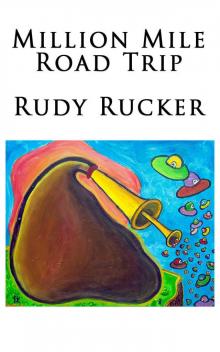 Million Mile Road Trip
Million Mile Road Trip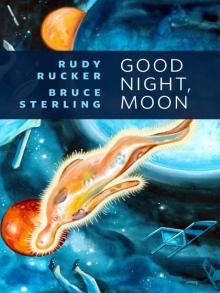 Good Night, Moon
Good Night, Moon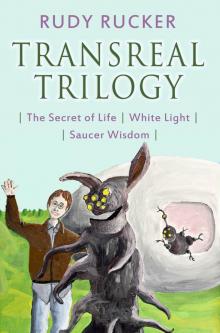 Transreal Trilogy: Secret of Life, White Light, Saucer Wisdom
Transreal Trilogy: Secret of Life, White Light, Saucer Wisdom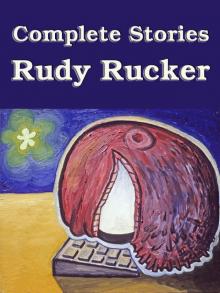 Complete Stories
Complete Stories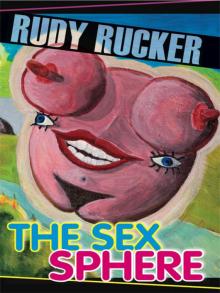 The Sex Sphere
The Sex Sphere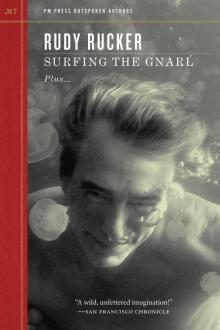 Surfing the Gnarl
Surfing the Gnarl Software
Software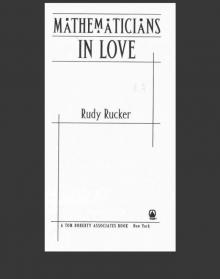 Mathematicians in Love
Mathematicians in Love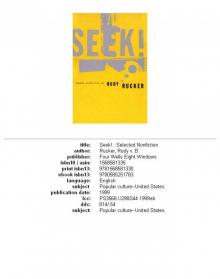 Seek!: Selected Nonfiction
Seek!: Selected Nonfiction The Secret of Life
The Secret of Life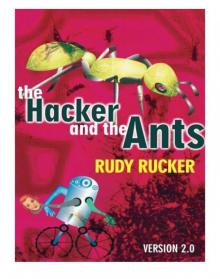 The Hacker and the Ants
The Hacker and the Ants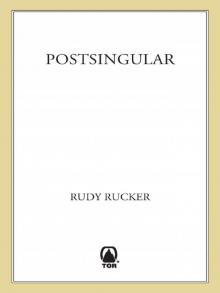 Postsingular
Postsingular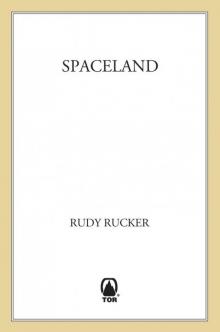 Spaceland
Spaceland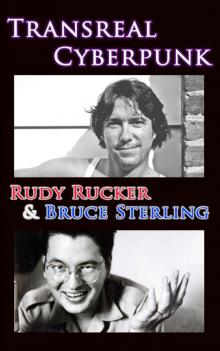 Transreal Cyberpunk
Transreal Cyberpunk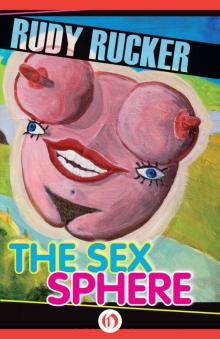 Sex Sphere
Sex Sphere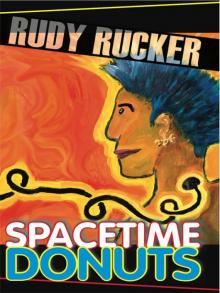 Spacetime Donuts
Spacetime Donuts Freeware
Freeware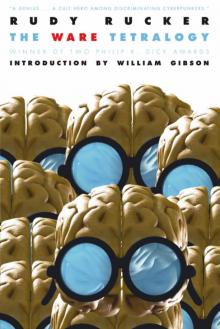 The Ware Tetralogy
The Ware Tetralogy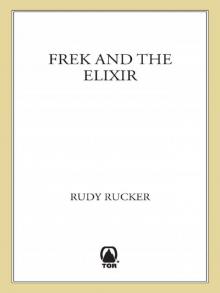 Frek and the Elixir
Frek and the Elixir Junk DNA
Junk DNA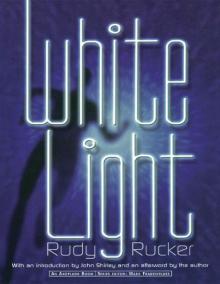 White Light (Axoplasm Books)
White Light (Axoplasm Books)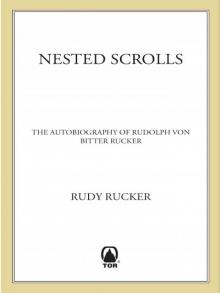 Nested Scrolls
Nested Scrolls Inside Out
Inside Out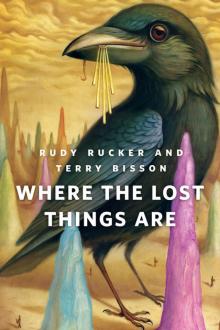 Where the Lost Things Are
Where the Lost Things Are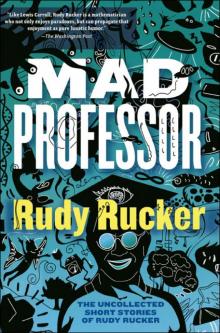 Mad Professor
Mad Professor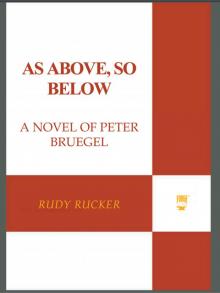 As Above, So Below
As Above, So Below Realware
Realware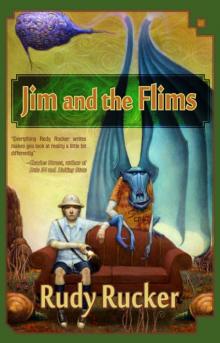 Jim and the Flims
Jim and the Flims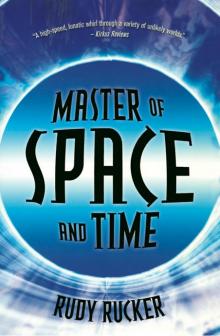 Master of Space and Time
Master of Space and Time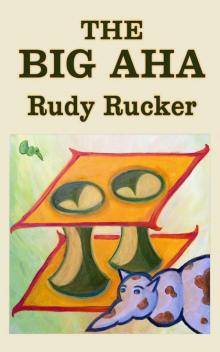 The Big Aha
The Big Aha Hylozoic
Hylozoic